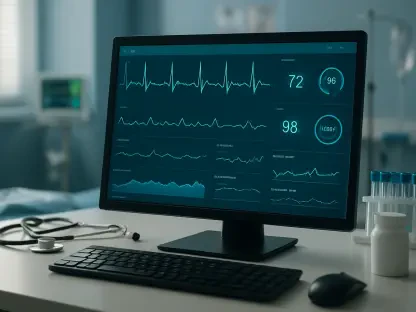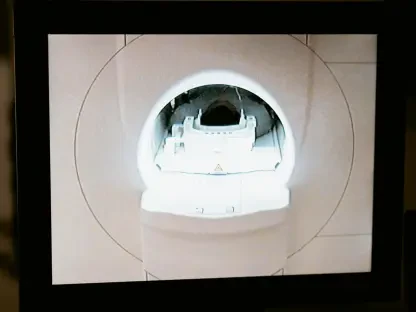In a groundbreaking stride for medical innovation, BCAL Diagnostics, an Australian company listed on the ASX under the ticker BDX, has emerged as a beacon of hope in the fight against cancer with its latest diagnostic advancements. The introduction of cutting-edge blood tests for pancreatic and ovarian cancer, alongside an enhanced breast cancer screening tool, marks a pivotal moment for early detection in the region. These tests, developed through a strategic partnership with US-based ClearNote Health, are now available in the Australian market under an exclusive licensing agreement. This development not only addresses critical gaps in diagnosing some of the most challenging cancers at their earliest stages but also positions Australia at the forefront of non-invasive cancer detection technology. The significance of such innovation cannot be overstated, as it promises to transform patient outcomes by catching diseases before they progress to more severe, less treatable stages, ultimately saving countless lives.
Advancing Cancer Detection Technology
Pioneering Pancreatic and Ovarian Tests with Avantect
BCAL Diagnostics has introduced the Avantect blood tests for pancreatic and ovarian cancer, leveraging the epigenomics platform from ClearNote Health to deliver unprecedented accuracy. These DNA-based tests target high-risk populations, with the ovarian test initially focusing on women with family histories or genetic predispositions like BRCA mutations. The pancreatic test stands out for its ability to detect the disease at Stages 1 and 2, a feat previously unattainable with existing blood-based diagnostics. Clinical data reveals an impressive sensitivity of 82.6% and specificity of 97.5% across a validation cohort of 1,445 tests, demonstrating reliability even in patients with vague symptoms such as abdominal discomfort. This capability is particularly vital for early intervention, where treatment options are more effective and survival rates are significantly higher, offering a lifeline to those who might otherwise face late-stage diagnoses.
Beyond individual patient benefits, the Avantect pancreatic test holds immense potential for monitoring at-risk groups, such as individuals newly diagnosed with Type 2 diabetes, who face elevated risks within the first few years. With over 20,000 new diabetes cases annually in Australia, this translates to a substantial population of around 60,000 individuals who could benefit from regular screening. The test’s application in such a large demographic underscores its transformative impact on public health strategies. Furthermore, ongoing global studies, including a UK trial with 15,000 participants, are evaluating the advantages of semi-annual testing, with early results suggesting even stronger real-world performance than initial validations. Such findings reinforce the test’s clinical value and pave the way for broader adoption in routine medical practice across diverse healthcare settings.
Global Validation and Regulatory Milestones
The credibility of the Avantect pancreatic test is further solidified through international research efforts, such as the Pancreatic Cancer Early Detection (PRECEDE) study, which spans multiple countries. Interim results from this study indicate that the test exceeds its validated benchmarks when applied in real-world scenarios, particularly for surveillance among high-risk groups. This consistent outperformance highlights the robustness of the technology and its adaptability to varied patient profiles. The implications of these findings are profound, suggesting that healthcare providers can rely on this tool to identify cancer at its most treatable stages, thereby reducing mortality rates associated with late diagnoses and enhancing overall patient care standards.
Adding to this momentum, the recent fast-track regulatory approval in the UK for the pancreatic test marks a significant step toward global acceptance and commercialization. This achievement not only validates the test’s efficacy and safety but also accelerates its integration into clinical workflows in other regions, including Australia. Such regulatory endorsements are critical for building trust among medical professionals and patients alike, ensuring that the technology is perceived as a reliable component of cancer screening protocols. As these validations continue to accumulate, BCAL Diagnostics is well-positioned to influence global standards in early cancer detection, potentially reshaping how healthcare systems approach preventive diagnostics.
Expanding Access to Breast Cancer Screening
Enhancing BREASTEST Plus for Wider Reach
Alongside the Avantect tests, BCAL Diagnostics is advancing its BREASTEST Plus blood test, designed to complement traditional mammograms in breast cancer screening. Initially developed for women with dense breast tissue, recent data analysis has broadened its applicability to a larger demographic of women undergoing breast cancer evaluation. This expansion reflects a commitment to inclusivity in diagnostic solutions, ensuring that more patients can access non-invasive testing options regardless of their specific breast tissue characteristics. Currently offered in Sydney and Melbourne, plans are underway to extend availability to Brisbane, thereby increasing reach and supporting healthcare providers in delivering comprehensive care across major Australian cities.
The significance of BREASTEST Plus lies in its ability to provide an additional layer of screening accuracy, particularly in cases where mammograms may yield inconclusive results. By integrating this test into routine evaluations, BCAL Diagnostics aims to reduce diagnostic uncertainties and enable earlier interventions, which are crucial for improving survival rates. The strategic rollout to additional locations also demonstrates a proactive approach to addressing regional disparities in access to advanced medical technologies. As more patients and clinicians gain exposure to this tool, its adoption could redefine standard practices in breast cancer detection, fostering a more preventive healthcare landscape in Australia.
Commitment to Early Detection Outcomes
The overarching mission of BCAL Diagnostics is evident in its focus on early detection as a cornerstone for improving cancer survival rates. Pancreatic cancer, often diagnosed at advanced stages with a poor prognosis, stands to benefit immensely from the Avantect test’s early-stage detection capabilities. Similarly, the enhanced accessibility of BREASTEST Plus underscores a dedication to tackling breast cancer with innovative, patient-friendly methods. CEO Shane Ryan has described the partnership with ClearNote Health as transformative, emphasizing the profound impact these tools will have on the Australian medical community and beyond, setting a new benchmark for diagnostic precision.
Looking back, the journey to bring these diagnostic solutions to market reflected a blend of clinical innovation and strategic foresight. The robust performance data and international validations that supported the launch of Avantect tests, coupled with the expanded reach of BREASTEST Plus, highlighted BCAL Diagnostics’ pivotal role in advancing cancer care. Moving forward, the focus should remain on scaling access to these tests, integrating them into national health policies, and continuing research to refine their applications. These steps will ensure that the benefits of early detection reach every corner of society, ultimately reducing the burden of cancer through sustained, impactful innovation.









